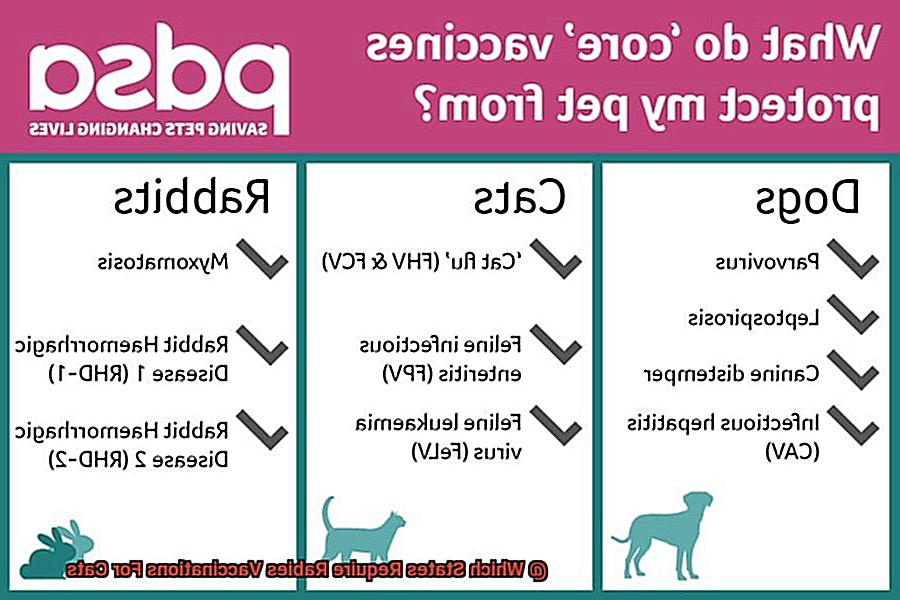As a cat owner or someone considering getting a feline companion, you know that keeping them healthy and disease-free is essential.
One of the most dangerous diseases that can affect cats is rabies, a deadly viral infection that can be transmitted to humans. That’s why vaccinating your cat against rabies is crucial.
However, did you know that not all states in the US require rabies vaccinations for cats? The vaccination requirements vary significantly depending on where you live.
Some states have strict laws that require cats to receive yearly vaccinations against rabies, while others have more relaxed regulations. It’s important to know which category your state falls under if you plan on traveling with your furry friend or relocating to another state.
In this blog post, we will provide you with everything you need to know about which states require rabies vaccinations for cats. We’ll cover the legal obligations and penalties for non-compliance so that you can keep your cat safe and healthy.
So, let’s get started.
What is Rabies?
Let’s delve into the topic of rabies, a viral disease that poses a grave threat to felines and humans alike.
Rabies is primarily spread through the saliva of infected animals, such as bats, raccoons, and skunks. Once the virus enters the body, it attacks the nervous system, causing inflammation of the brain and spinal cord.
Symptoms of rabies in cats are not immediate and can take weeks to months to appear. These symptoms may include aggression, lethargy, hypersensitivity to touch or sound, paralysis, and seizures.
Sadly, there is no cure for rabies once symptoms manifest. Therefore, vaccination is essential to prevent this deadly disease.
While not all states mandate rabies vaccination in cats, it is highly recommended by veterinarians to safeguard both pets and their human families. It’s worth noting that vaccination requirements vary widely across different states in the US.
Certain states demand annual vaccinations while others only require them every three years. As a responsible pet owner, it is essential to consult with your veterinarian and research your state’s laws to determine the appropriate vaccination schedule for your feline friend based on your location and individual circumstances.
Vaccinating your cat against rabies is crucial as it not only protects your beloved pet but also prevents the spread of this infectious disease to other animals and humans. Cats are particularly vulnerable to rabies as they are more likely to venture outdoors and come into contact with wild animals that may carry the virus.
It’s important to comply with state laws regarding rabies vaccinations as failure to do so can result in legal repercussions and hefty fines.
The Risk of Contracting Rabies in Cats
Rabies, a viral disease that affects the nervous system of mammals, including cats, is transmitted through the saliva of infected animals – often through bites.
It’s a fatal disease that can also affect humans. As a responsible cat owner, it’s essential to take measures to protect your pet from contracting this deadly disease.
Cats are at high risk of contracting rabies if they come into contact with infected animals – especially wild animals such as raccoons, skunks, bats, and foxes. Outdoor cats are particularly vulnerable to exposure to these animals.
Symptoms of rabies in cats can include behavioral changes, seizures, and aggression. However, not all infected cats show symptoms, and once symptoms appear, the disease is usually fatal.
The good news is that vaccination is the most effective way to prevent rabies in cats. All cats should be vaccinated against this deadly disease to protect them from contracting it.
The vaccine is safe and effective and can be administered by a veterinarian. It’s important for cat owners to be aware of their state’s laws regarding rabies vaccinations to avoid legal repercussions and hefty fines.
Some states require annual vaccinations, while others require vaccinations every three years. Consult with a veterinarian to determine which vaccination schedule is appropriate for your cat.
So, rabies poses a serious threat to cats, and it’s crucial for cat owners to take preventative measures against this deadly disease. Vaccination is the best way to protect your furry friend from contracting rabies.
Overview of State Vaccination Laws

And one of the most effective ways to do this is by getting them vaccinated against rabies.

But did you know that every state has its own set of laws regarding rabies vaccinations for pets, including cats? Knowing the state and local laws surrounding rabies vaccinations for cats is crucial for every pet owner.
Not only does it ensure you are compliant and avoid any penalties, but it also helps protect your cat, your family, and your community from the dangers of this deadly disease. While most states require cats to receive a rabies vaccination, there are some exceptions.
For instance, in Alabama, only dogs are required to have a rabies vaccine, while in Hawaii, there are no laws regarding rabies vaccinations for cats or dogs. Regardless of where you live, it is still highly recommended to get your cat vaccinated against rabies as it can be transmitted from animals to humans.
It’s also important to remember that local city and county regulations may have their own requirements for pet vaccinations. In New York City, for example, all cats and dogs must receive a rabies vaccination by four months of age and then receive booster shots every one to three years depending on the vaccine used.

Not complying with these laws can result in fines or even the removal of your pet from your custody. That’s why keeping records of your cat’s vaccinations is crucial as proof of compliance with state and local laws.
So, protecting your cat from rabies isn’t just a responsibility – it’s a legal obligation too. By understanding state and local laws regarding rabies vaccinations for cats, you can ensure the health and safety of your precious pet as well as your family and community.
Consult with your veterinarian to determine the appropriate vaccination schedule for your cat and keep them up-to-date on their shots.
Variations in State Requirements
However, each state has its own laws regarding this issue, and they can vary widely.
For instance, in California, all cats over four months of age must be vaccinated against rabies. So if you live in the Golden State and have a feline friend, make sure to schedule their vaccination appointment with your veterinarian.
On the other hand, in Hawaii, the law only requires rabies vaccinations for cats entering the state or those that have bitten a person or another animal. Some states differentiate between indoor and outdoor cats.
In New York, only outdoor cats are required to be vaccinated against rabies as they are more likely to come into contact with wildlife that could carry the virus. In contrast, both indoor and outdoor cats in Massachusetts must be vaccinated against rabies if they are over six months of age.
It’s essential to keep in mind that state laws regarding rabies vaccinations for cats can change over time. Therefore, it’s crucial to check with your local veterinarian or animal control department to stay up-to-date on the latest regulations in your area.
Exemptions for Certain Medical Conditions
That’s why it’s crucial to understand exemptions for certain medical conditions when it comes to rabies vaccinations.
While most states mandate rabies vaccinations for cats, exemptions are available for those with medical conditions that make vaccination dangerous or impossible. These exemptions are granted on a case-by-case basis and require certification from a licensed veterinarian.
Medical conditions that may qualify for an exemption include severe allergic reactions to the vaccine, immune system disorders, and other health issues that may put the cat at risk if they receive the vaccine. However, it’s important to note that exemptions do not exempt cats from local animal control regulations regarding rabies, such as quarantine requirements if they come into contact with a rabid animal.
It’s crucial for cat owners to work closely with their veterinarian to determine if their cat qualifies for an exemption. In some states, the exemptions are only temporary and require a re-evaluation by the veterinarian after a certain period of time.
Consequences of Failing to Comply with the Law
While the regulations may vary depending on your state, not vaccinating your furry companion can lead to serious legal and financial repercussions.
One of the most common consequences of failing to comply with rabies vaccination laws is a fine. The amount of this penalty depends on the state and the severity of the offense.

For instance, in Virginia, you could face a hefty fine of up to $250 for not vaccinating your cat against rabies. But that’s not all.
If you don’t follow the law, legal action may be taken against you. This means that your beloved feline may be taken away from you, or you might even face a misdemeanor or felony charge.
Moreover, if your unvaccinated cat bites someone, you’ll be held responsible for any medical expenses or damages resulting from the injury. This could even lead to legal action being taken against you.
It’s worth noting that these consequences are not only in place to protect public health but also to safeguard your cat’s health and well-being. Rabies is a severe and potentially fatal disease that can be transmitted to humans through infected animals, including unvaccinated cats.
zDxY8NMo67U” >
Conclusion

It’s crucial to understand the laws and regulations regarding rabies vaccinations in your state.
While most states require yearly or triennial vaccinations against rabies, some have more relaxed regulations. But why is this important?
Well, rabies is a deadly viral infection that can be transmitted to humans through the saliva of infected animals such as bats, raccoons, and skunks. Vaccinating your cat against rabies is essential to prevent this deadly disease.
Cats are particularly vulnerable to rabies as they are more likely to venture outdoors and come into contact with wild animals that may carry the virus. And failing to comply with state laws regarding rabies vaccinations can result in legal repercussions and hefty fines – not something any cat owner wants.
To ensure the health and safety of your feline friend, it’s important to work closely with your veterinarian to determine the appropriate vaccination schedule based on your location and individual circumstances. Although exemptions for certain medical conditions are available on a case-by-case basis, they do not exempt cats from local animal control regulations regarding rabies.
By keeping your cat up-to-date on their vaccinations, you’re not only protecting them from harm but also preventing the spread of this infectious disease to other animals and humans.

